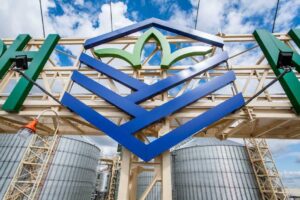
One of Ukraine’s largest grain market operators, Nibulon LLC, recouped approximately $1 million in investments in a digital twin of elevators developed on the basis of the IT-Enterprise ERP system in less than a year by reducing the number of employees and grain losses.
“In conditions of staff shortages, the system allows us to reduce our dependence on manual labor… Previously, 80-100 people worked at one elevator, today there are about 20-30,” according to a joint press release issued by the companies on Monday.
It is noted that the implementation of the new system from IT-Enterprise has improved accounting accuracy and reduced grain losses by 1%.
“We have improved quantitative and qualitative accounting and automated every step of the process: the movement of grain from the moment it arrives at the elevator to shipment to the end consumer, including control of grain quality indicators and resources spent on its processing,” the release quotes Nibulon IT Director Mykola Ryasko as saying.
In addition, it was possible to ensure transparent access to grain quality parameters determined as a result of laboratory tests. In particular, the data is now available in a mobile application along with other operational information.
The agricultural holding specified that it integrated the digital twin of 23 elevators in 2024. “A digital twin is a digital copy of production that is updated in real time based on data from sensors and other sources. This allows you to effectively simulate elevator operating modes and manage all processes from anywhere in the world,” commented Oleg Shcherbatenko, CEO and founder of IT-Enterprise, on the project.
As previously reported by Andriy Vadatursky, owner and CEO of Nibulon, in 2024 the company invested $2 million in the digitization of production processes, which was directed towards the creation of a digital copy of the elevator and a mobile application. According to him, the software has been installed on all of the grain trader’s elevators and connected to a common network.
Before the war, Nibulon cultivated 82,000 hectares of land in 12 regions of Ukraine and exported agricultural products to more than 70 countries around the world. In 2021, the grain trader exported a record 5.64 million tons of agricultural products. After the war began, the company was forced to move its central office from Mykolaiv to Kyiv.
This year, Nibulon plans to increase grain exports to 4 million tons from 2.5 million tons last year, while its land bank has shrunk to 1,000 hectares and its workforce has fallen from 6,000 to less than 2,000.
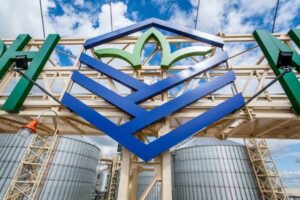
One of the largest operators in the Ukrainian grain market, Nibulon LLC, invested $2 million in the digitization of production processes in 2024, which was directed toward the creation of a digital copy of the elevator and a mobile application, according to the company’s owner and CEO Andriy Vadatursky.
“We have about 100 people (working in the field of digitalization – IF-U). We recruited many of them from the market and provided them with work. We have detailed plans for the implementation of projects for three years. We know the detailed plan for the month, for the year, and we know the prospects for three years. We also plan to provide services specifically for the projects we are doing for Nibulon. We believe that if it is necessary for Nibulon, then it will also be necessary for the market,” he said at the Forbes Agro conference in Kyiv last Friday.
Among the main projects in which funds were invested, Vadatursky named a digital copy of the elevator, in particular, the purchase and installation of modern equipment that determines the quality of grain. The software is installed at all of the grain trader’s elevators and is connected to a common network. Thanks to this, responsibility at the elevators has been strengthened, the quality of raw materials is clearly determined, the influence of the human factor has been minimized, and reporting has been streamlined.
In addition, Nibulon has developed a mobile application—a company account where you can receive news, prices, information about the location of transport, the quality of grain in it, funds received, discounts, bonuses, etc.
According to Vadatursky, this application will be refined and transformed into an information platform in the near future.
Before the war, Nibulon cultivated 82,000 hectares of land in 12 regions of Ukraine and exported agricultural products to more than 70 countries around the world. In 2021, the grain trader exported a record 5.64 million tons of agricultural products and delivered record volumes to foreign markets in August (0.7 million tons), in the fourth quarter (1.88 million tons), and in the second half of the year (3.71 million tons).
After the war began, the company was forced to move its headquarters from Mykolaiv to Kyiv.
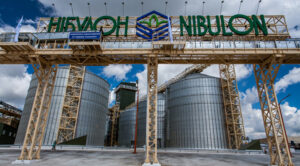
One of Ukraine’s largest grain market operators, Nibulon, has reduced its staff threefold, retained four areas of operation, focused on the introduction of new digital services and technologies, and plans to return to its pre-war share of 10% of Ukraine’s grain exports by increasing exports this year to 4 million tons from 2.5 million tons last year, said the company’s owner and CEO Andriy Vadatursky.
“Before the war, the company employed 6,000 people. When I was waiting (for the core team to move from Mykolaiv to Kyiv – IF-U), there were 4,000 employees. Now there are a little less than 2,000. This is the path to optimization and automation of numbers. When people ask, ‘What has changed for you?’, I answer that everything has changed – the entire business model has changed,” he said at the Forbes Agro 2025 conference in Kyiv on Friday.
Vadatursky noted that Nibulon currently has four main business areas: agricultural production, logistics, trading, and digitalization.
According to him, Nibulon is developing agricultural production on slightly more than 50,000 hectares, while before the war, the agricultural holding operated on 82,000 hectares. Its lost agricultural land is located in the Luhansk and Kharkiv regions. In addition, before the war, the grain trader owned 28 elevators, 5 of which have been lost and 13 blocked. Nibulon’s logistics company currently operates 167 motor vehicles and 200 grain cars.
According to the company’s owner, the agricultural holding currently grows approximately 300,000 tons of grain on its own. However, in 2024, Nibulon was able to export 2.5 million tons of grain, and in 2025, it plans to supply up to 4 million tons to foreign markets.
“It is no secret that Nibulon entered the war with $530 million in loans. Currently, we have confirmed losses of $440 million, which, in addition to the loss of land and elevators, include the loss of about 140,000 tons of grain,” Vadatursky said, adding that in three years of war, the agricultural holding was able to earn $250 million and repay $160 million in debts to banks.
He assured that Nibulon intends to continue servicing its loans in 2025, despite the fact that 68% of its assets are currently not operational.
Vadatursky explained that during the war, Nibulon will focus on the efficiency of its businesses, their expansion, and vertical integration. At the same time, the main criteria will be efficiency and “streamlining by removing all inefficient components.” In addition, the grain trader will focus on the introduction of new technologies, digitalization, and artificial intelligence.
“We are targeting approximately $60-80 million in EBITDA to be able to repay all loans. To this end, we are doing everything we can to increase the amount of grain that passes through our system. And we have the ambition to return to our pre-war share of exports, which was about 10-12% of Ukraine’s total grain exports, by providing more competitive services than before the war and earning money through the introduction of technologies and increased efficiency,” the owner of the agricultural holding concluded.
Before the war, Nibulon cultivated 82,000 hectares of land in 12 regions of Ukraine and exported agricultural products to more than 70 countries around the world. In 2021, the grain trader exported a record 5.64 million tons of agricultural products and supplied record volumes to foreign markets in August (0.7 million tons), in the fourth quarter (1.88 million tons), and in the second half of the year (3.71 million tons).
After the war began, the company was forced to move its headquarters from Mykolaiv to Kyiv.

The logistics department of one of Ukraine’s largest grain market operators, Nibulon LLC, has transported over 40,000 tons of grain from its partners to the company’s elevators and ports since the beginning of the 2025-2026 marketing year (July-June), the grain trader’s press service reported on Facebook.
According to the report, about 100 of the company’s vehicles are currently working on harvesting its own products in various regions.
“33 trucks from the Nibulon fleet are fulfilling external orders, helping agricultural producers deliver their harvested crops on time,” the report said.
The agricultural holding noted that the company offers a full range of services for farmers: harvesting, transportation, storage, and further sale of products.
The “Transportation” service can be ordered via the NIBULON APP mobile application, where you can select a route, track your cargo in real time, and manage logistics from your phone. Grain is transported from the field to the Nibulon elevator, from the field to the port, and from the field to the warehouse.
The main advantages of the agricultural holding are an individual tariff depending on the distance (t/km); modern, economical equipment = lower cost; online cargo tracking; a chatbot for registering vehicles and unloading without queues.
NIBULON LLC was established in 1991. Before the Russian military invasion, the grain trader had 27 transshipment terminals and complexes for receiving agricultural crops, a capacity for one-time storage of 2.25 million tons of agricultural products, a fleet of 83 vessels (including 23 tugboats), and also owned the Mykolaiv Shipyard.
Before the war, Nibulon cultivated 82,000 hectares of land in 12 regions of Ukraine and exported agricultural products to more than 70 countries around the world. In 2021, the grain trader exported a record 5.64 million tons of agricultural products and supplied record volumes to foreign markets in August (0.7 million tons), in the fourth quarter (1.88 million tons), and in the second half of the year (3.71 million tons).
The grain trader is currently operating at 32% of its capacity, has created a special unit for demining agricultural land, and has been forced to move its central office from Mykolaiv to Kyiv.
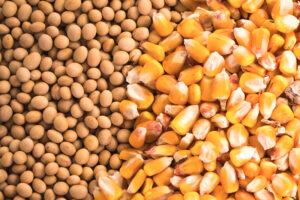
One of Ukraine’s largest grain market operators, Nibulon, has begun harvesting late grain crops in the Cherkasy and Khmelnytsky regions, according to a Facebook post by the grain trader’s press service.
According to the report, the Chyhyryn branch in the Cherkasy region, where corn is harvested on an area of 9,500 hectares, was the first to start harvesting late grain crops in the 2025 season.
“Despite the difficult weather conditions during the growing season, corn in this region yielded 7 tons per hectare. The total planned gross corn harvest for the holding is 180,000 tons. The total area under this crop this year is 22,577 hectares. As of today, the first 2,000 hectares have been threshed. Eight combines and 70 grain trucks are involved in the corn harvest,” the agricultural holding said.
In addition, the soybean harvest has begun in the Khmilnytskyi and Kamianets-Podilskyi clusters. The first 500 hectares have been threshed with a yield of 3.2 tons. In total, they have 9,600 hectares to harvest. Twelve combines and 40 grain trucks are working on threshing this crop.
Immediately after harvesting, Nibulon will cultivate the soil for sowing in 2026. The priority is strip-till and deep loosening.
“Overall, 2025 has been a difficult year for agriculture. This year’s weather, in particular the lack of productive rainfall in the central and especially southern regions of Ukraine, did not contribute to record harvests. Since the beginning of the year, only 220 mm of precipitation has been recorded in the Chyhyryn area, and it should be noted that a significant part of it was not productive and was not effective in fully meeting the moisture needs of corn, especially at critical stages of plant development,” the agricultural holding noted.
Nibulon was able to achieve a stable harvest despite the moisture deficit by implementing a set of resource-saving agricultural technologies, including economical soil cultivation, adherence to early sowing dates, and the competent selection of corn hybrids with FAO 220–250, which are highly drought-resistant and release moisture quickly during ripening.
Nibulon LLC was established in 1991. Before the Russian military invasion, the grain trader had 27 transshipment terminals and complexes for receiving agricultural crops, a capacity for one-time storage of 2.25 million tons of agricultural products, a fleet of 83 vessels (including 23 tugboats), and owned the Mykolaiv Shipyard.
Before the war, Nibulon cultivated 82,000 hectares of land in 12 regions of Ukraine and exported agricultural products to more than 70 countries around the world. In 2021, the grain trader exported a record 5.64 million tons of agricultural products and supplied record volumes to foreign markets in August (0.7 million tons), in the fourth quarter (1.88 million tons), and in the second half of the year (3.71 million tons).
The grain trader is currently operating at 32% of its capacity, has created a special unit for demining agricultural land, and has been forced to move its central office from Mykolaiv to Kyiv.
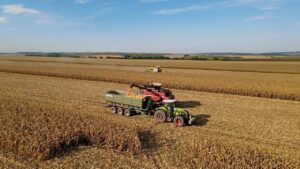
Nibulon, one of Ukraine’s largest grain market operators, has launched a new service – harvesting. The grain trader has already processed more than 5,000 hectares in the Odesa region, according to its press service.
According to the report, Nibulon uses Claas Lexion 7700 combines and its own fleet of trucks to carry out the work, which allows it to control the entire chain from the field to the elevator.
The harvesting service includes the delivery of equipment exactly on time, transparent pricing — a fixed rate per crop, booking without obligations, but with priority during the season.
The agricultural holding is now ready to scale up and sign further contracts with producers throughout Ukraine.
Nibulon LLC was established in 1991. Before the Russian military invasion, the grain trader had 27 transshipment terminals and complexes for receiving agricultural crops, a capacity for one-time storage of 2.25 million tons of agricultural products, a fleet of 83 vessels (including 23 tugboats), and owned the Mykolaiv Shipyard.
Before the war, Nibulon cultivated 82,000 hectares of land in 12 regions of Ukraine and exported agricultural products to more than 70 countries around the world. In 2021, the grain trader exported a record 5.64 million tons of agricultural products and delivered record volumes to foreign markets in August (0.7 million tons), in the fourth quarter (1.88 million tons), and in the second half of the year (3.71 million tons).
The grain trader is currently operating at 32% of its capacity, has created a special unit for demining agricultural land, and has been forced to move its central office from Mykolaiv to Kyiv.